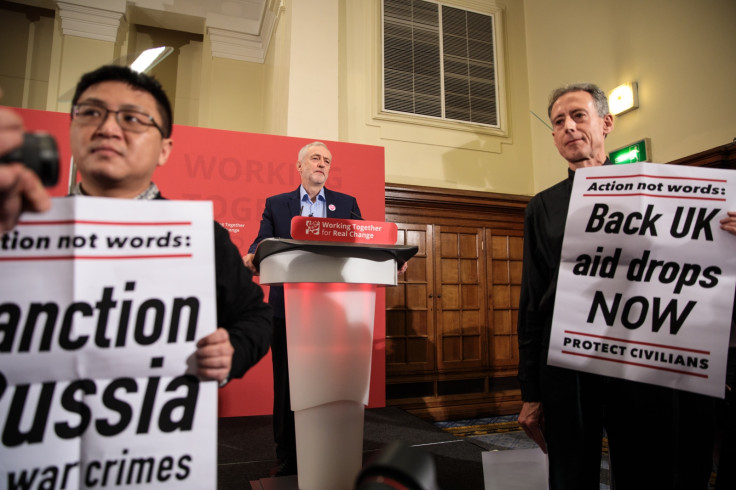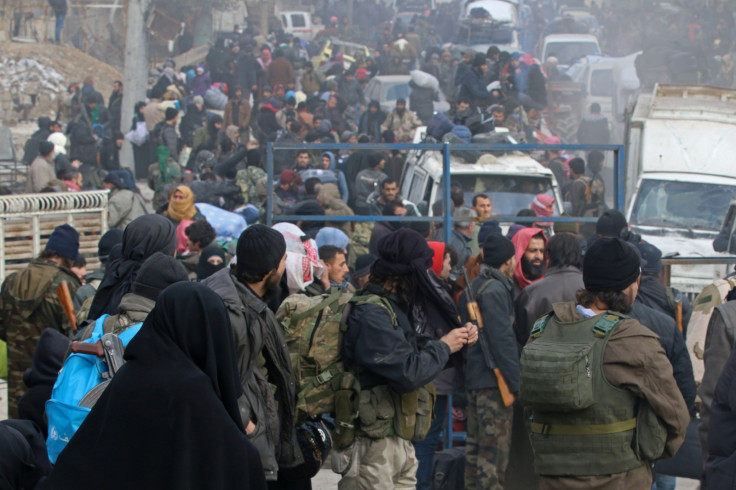Jeremy Corbyn's silence over Aleppo shows how he has become a lobbyist for Iran
Labour leader does not understand Syria is an open sore, from which the poison of fascist populism is spreading.

As Aleppo was consumed by fascist counterrevolution, while the people of the formerly liberated eastern areas of the city were being cleansed or dying waiting to be cleansed, Jeremy Corbyn, the Leader of the Labour Party and Her Majesty's Opposition, was attending a Christmas fundraising dinner for the Stop the War Coalition (SWC). You might think his attendance of such an event is generally innocuous and unconnected to far off happenings in Syria. You'd be wrong.
One might wonder why Jeremy Corbyn has been so quiet on Syria on the face of the fall of Aleppo, or why, when challenged by Peter Tatchell, he had to leave to find out what the correct public line of his leadership was on Syria? Or why, during the emergency debate on Aleppo in the UK parliament, the alleged internationalist Corbyn stayed only to hear the meandering, incoherent speech of his shadow foreign secretary Emily Thornberry, before leaving without saying a word? If you are wondering these things then you ought to look no further than not simply his connection with the SWC, but his ideological congruence with it.
The SWC has been among the loudest voices over the last five years that have sought to push narratives supporting the regime of Bashar al-Assad, as well as his partners Iran and Russia, as they unleashed a genocidal war against Syrians who rose up against them in the name of freedom and self-determination. It has hosted a number of pro-regime and, not-so-ironically if you understand the function of the SWC, pro-war voices such as its vice chairman and Corbyn's long-standing comrade George Galloway, who took to Twitter to praise the 'Syrian Arab Army' at a time when it was going door-to-door murdering men, women and children in Aleppo. Though the SWC always disputes its support for Assad, Iran and Russia, a look at its output on the conflict over the years ought to leave one with very little doubt regarding their allegiances.
However, the fact that the leader of the UK's largest political party and the leader of the official opposition saw fit to attend this fundraiser is no surprise. Since becoming leader of the opposition, Corbyn has had to be more cautious about stating his views openly, but by just briefly looking into his recent history on these questions, his true views on the situation in Syria are obvious. It was he who was national chair of the SWC as they organised pro-Assad demos following Assad's gassing to death of over one thousands Syrian civilians at Ghouta, or when they invited Mother Agnes Mariam, who is not just a supporter of but a fully-fledged propagandist for Assad's genocidal war effort, to a 'peace' conference.
Moreover, if one takes a look through Corbyn's interventions in the British parliament, one can see that in every debate on whether the UK government should materially support Syrians resisting Assad, Iran and Russia, one can see the same essential message of hostility towards the Syrian revolution. This is not a subtle thing – though Corbyn might pay lip service to condemning in vague terms the "violence" in Syria, as a backbench MP, his interventions in parliament concerning Syria sought to repeat the regime's narrative that the rebels were Islamic extremists, akin to the Taliban.
In addition to this, Corbyn has essentially lobbied for Iran to be rewarded for its intervention in Syria, underwriting and participating in genocide, with a seat at the top table in terms of negotiating over Syria's future. This is not a point that should be glossed over. While progressives from all backgrounds understand that the dynamic in Syria, beyond all the complexities, is one between armed forces that arose as part of a popular revolution and a brutal tyrant and his foreign imperialist allies attempting to crush the revolution, those who are sympathetic to the regime have attempted to portray the revolution as a 'western' conspiracy against Iran.
Corbyn could easily be described as a lobbyist for the Iranian regime.
Corbyn is, of course, not crude enough to state this openly, but in combination with his will to slander the rebels as being akin to the Taliban and tie them to Islamic terrorism, he has been keen to push this idea as a justification for Iranian intervention on behalf of Assad. This is precisely what he did in a debate in parliament in May 2013, when he claimed that despite the presence of its troops in Syria, Iran was only 'presumably helping Assad' as it felt "under threat" from the Syrian revolution due to the "vast amount of arms" being supplied to the rebels, adding that Iran might be "next on the western countries" hit list'.
While it's never overtly stated, the inferences here is that Assad and Iran are the victims. The idea, much-loved by Assad, Iran and Russia's propagandists, that there exists an actual 'hit list' of countries that the West wants to overthrow for all kinds of nefarious reasons. As with all conspiracy theories, the essential point of this is not to elucidate any facts but rather to obfuscate them – in this case it's the crimes of fascistic and anti-human tyrannies that are conceived to be 'anti-western' in their geopolitical demeanour and are thus to be supported, regardless of whether there is an actually existing revolution against them or whether they are imposing their hegemony over Syrians seeking self-determination.
Corbyn could easily be described as a lobbyist for the Iranian regime. In the same sleazy manner as the Tory politicians, so hated by Corbyn and his supporters, who claim to support 'human rights' in Saudi Arabia before selling them weapons and the means to maintain their domestic tyranny, Corbyn has strongly advocated that such relations be transferred from Saudi's brutal theocracy to that of the Iranian regime's.
In article for, of all places, the Morning Star, entitled 'Rebuilding Relations With Iran', written in 2014, after the Iranian regime's brutal crushing of the nascent democratic Green uprising and during its key participation in the genocidal war effort of Assad in Syria, Corbyn makes a sordid case for normalising relations with the regime, employing the usual juvenile whataboutery and dubious historical validations that comprise justifications and apologia Iranian regime. Corbyn vaguely mentions something about the Iranian regime's treatment of 'trade union movements', but doesn't mention the crushing of the Green Movement or its support for who he calls in the article 'President Assad of Syria', who, with Iran's direction and help had at that point managed to murder around 400,000 people.

But why would Corbyn mention any of Iran's crimes in Syria in the article – or at all? This a person who has received money from the Iranian regime via its anti-Semitic, sectarian propaganda outlet Press TV, as well as being a guest of the regime on various occasions, including posing for photos with regime officials.
It's for this reason that, during the emergency debate on Aleppo, Corbyn the internationalist couldn't find his voice; instead, the dreaded Labour 'centrists' and Liberal Democrats put the progressive view on Syria forward. However, the key point of the entire debate was made by George Osborne, who recognised the genocidal dimensions of what was occurring in Syria and the West's responsibility in failing to support the rebels, but also its capacity in aiding the rise of fascism in Europe.
Corbyn's stance on Syria makes it impossible for him to understand this dynamic, the dynamic of Syria as an open sore from which the poison of fascism and post-fact populism is spreading and infecting the whole world, the necessity is now for a progressive opposition to emerge. One that not only understands this dynamic but is equipped to meet it head on, as opposed to appease or acquiesce to it. Labourites must understand Syria and Aleppo as existential moments for them and for the very foundations of progressive politics, just as their late colleague Jo Cox did.
The Labour Party is actually a microcosm for the current dynamics that have been exacerbated by the Syrian crisis. The party is currently caught between the legacy of the malfeasance of Blairism, the crimes of which have been a devil on the back of the Syrian revolution, as well as the consequences of such malfeasance – the symbolically 'left-wing' symptom of the general disease that is rapidly devouring the centre in western politics.
And make no mistake: this is what Corbyn and his movement represents, socialism at home and support for fascist counterrevolution abroad. The kind of movement that managed to outdo the Daily Mail's infamous 'Hurrah for the Blackshirts' by praising the triumph of fascism in Aleppo as a 'liberation', much in the same way it praises the triumph of Donald Trump and the 'alt-right' in the US as a revolt against 'neoliberalism'.
The genocide in Syria determined by Russia and Iran is the kind of world order envisioned by Corbyn and his ilk.
Sam Hamad is a Scottish-Egyptian writer based in Edinburgh. He specialises in Middle Eastern affairs.
© Copyright IBTimes 2025. All rights reserved.





















